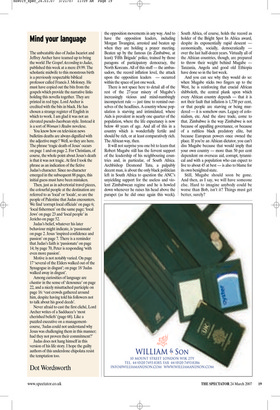Mind your language
The unbeatable duo of Judas Iscariot and Jeffrey Archer have teamed up to bring the world The Gospel According to Judas, published this week at a mere £9.99. The scholastic midwife to this monstrous birth is a previously respectable biblical professor called Francis J. Moloney. He must have copied out the bits from the gospels which provide the narrative links holding this novella together. They are printed in red type. Lord Archer is credited with the bits in black. He has chosen a strange register of English in which to work. I am glad it was not an elevated pseudo-Jacobean style. Instead it is a sort of Woman’s Realm novelese.
You know how on television news bulletins deaths are always dignified with the adjective tragic? Well, so they are here. The phrase ‘tragic death of Jesus’ occurs on page 1 and on page 2. For Christians, of course, the whole point about Jesus’s death is that it was not tragic. At first I took the phrase as an indication of the fictive Judas’s character. Since no character emerged in the subsequent 88 pages, this initial guess must have been mistaken.
Then, just as in advertorial travel pieces, the colourful people at the destination are referred to as ‘local’ or ‘locals’, so are the people of Palestine that Judas encounters. We find ‘corrupt local officials’ on page 6; ‘local fishermen’ on the same page; ‘local Jews’ on page 23 and ‘local people’ in Jericho on page 52.
Judas’s belief, whatever his later behaviour might indicate, is ‘passionate’ on page 2. Jesus ‘inspired confidence and passion’ on page 7. There is a reminder that Judas’s faith is ‘passionate’ on page 14; by page 70, Peter is responding ‘with even more passion’.
Motive is not notably varied. On page 17 ‘several of the Elders walked out of the Synagogue in disgust’; on page 18 ‘Judas walked away in disgust’.
Among curiosities of language are chastise in the sense of ‘denounce’ on page 22, and a nicely misattached participle on page 16: ‘vast crowds gathered around him, despite having told his followers not to talk about his good deeds’.
Never afraid to cast the first cliché, Lord Archer writes of a Sadducee’s ‘most cherished beliefs’ (page 68). Like a puzzled executive on a managementcourse, ‘Judas could not understand why Jesus was challenging them in this manner; had they not proven their commitment?’ Judas does not hang himself in this version of his life story. I hope the guilty authors of this underdone chipolata resist the temptation too.
Dot Wordsworth


















































































 Previous page
Previous page